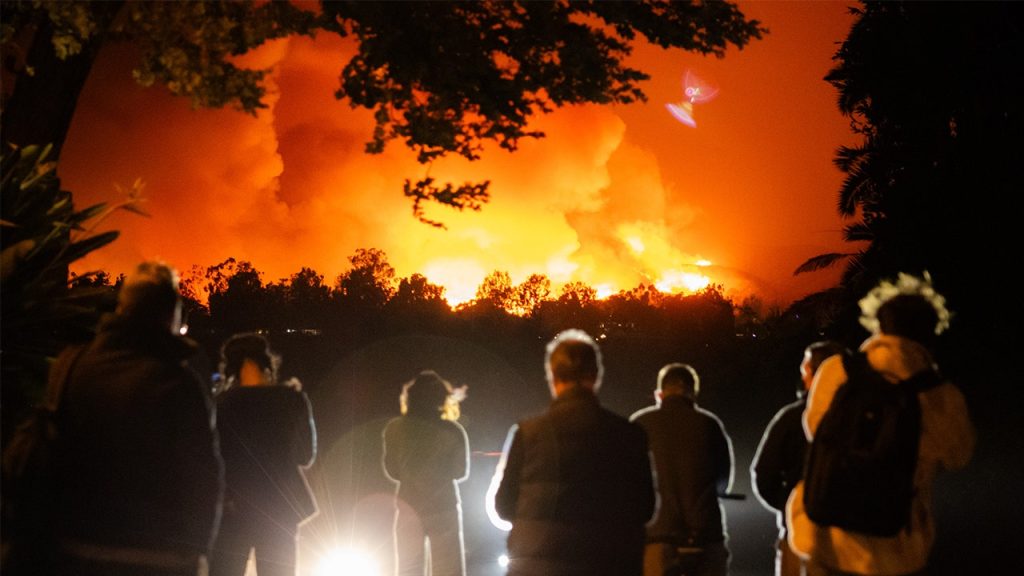The affluent Pacific Palisades community in Los Angeles, currently grappling with a devastating wildfire, finds itself in a precarious situation. While its wealthy residents frequently rely on private security, bureaucratic hurdles are hindering these protective services from reaching them during this critical time. This situation has arisen amidst rising concerns about looting, with multiple arrests already made and authorities bracing for more. Private security firms, eager to assist their clients, are finding their efforts stymied by an unresponsive Los Angeles Police Department (LAPD). The difficulty in obtaining authorization to enter restricted areas has left residents feeling vulnerable and desperate, with some even resorting to risky measures to check on their properties. This regulatory bottleneck underscores a significant challenge in disaster response, highlighting the friction between private security efforts and official emergency protocols.
The Pacific Palisades, home to multimillion-dollar properties, is already a hotspot for burglaries and home invasions, making the current wildfire crisis even more threatening. Residents, understandably anxious about protecting their valuable assets, are facing increased vulnerability due to limited access to their private security teams. The wildfire has exacerbated existing security concerns, creating an environment ripe for opportunistic crime. While the flames pose an immediate threat, the potential for looting adds another layer of anxiety for homeowners who are forced to evacuate or remain in their homes, fearing for their possessions. This situation highlights the complex interplay of natural disasters and criminal activity, exposing the vulnerabilities of even the most affluent communities.
Experts within the private security industry point to inconsistencies in how authorities treat different firms. Some companies, led by individuals with law enforcement backgrounds, appear to face fewer obstacles than those without such connections. This disparity raises questions about fairness and access to essential security services during emergencies. Meanwhile, even seasoned security firms with extensive experience in crisis management are finding the Los Angeles landscape challenging to navigate. Some have withdrawn their services from the city altogether due to the intricate web of regulations and permitting processes. This withdrawal highlights the long-standing tensions between private security operations and municipal authorities, a dynamic that can impede effective disaster response.
Looting concerns are escalating alongside the fire’s advance, prompting some residents to remain in their homes despite the danger, fearing their properties will be targeted if left unattended. This adds another dimension to the emergency, forcing residents to choose between their personal safety and protecting their belongings. The combination of fire risk and potential looting creates a high-stakes dilemma for residents, underscoring the devastating impact of such disasters on both a personal and economic level. The presence of private security, if permitted access, could significantly alleviate these concerns, allowing residents to evacuate with greater peace of mind.
Private security operatives are experiencing immense pressure as they navigate the complexities of the crisis. They are tasked with balancing the needs of their clients against the constraints imposed by official regulations. This delicate balancing act requires constant communication and coordination with authorities, often in challenging and rapidly evolving circumstances. The current situation evokes comparisons to the aftermath of Hurricane Katrina, another devastating event that exposed vulnerabilities in disaster response and highlighted the critical role of private security. The overwhelming nature of the crisis is straining resources and testing the limits of both public and private security infrastructure.
Interestingly, the cancellation of Hollywood award shows has inadvertently freed up some private security resources, allowing these professionals to be redirected to assist communities affected by the fire. This unexpected reallocation of resources underscores the interconnectedness of various sectors and highlights the adaptability of the private security industry in times of crisis. While the entertainment industry faces disruptions, this shift in focus allows security personnel to contribute to a more immediate and pressing need, protecting homes and communities from both the fire and the potential for looting. This dynamic demonstrates how unexpected events can create opportunities for resource reallocation and collaboration between seemingly disparate industries.

